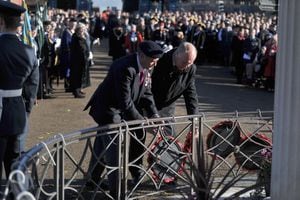Shropshire Star comment: Memories of fallen to live on
Today is the day after. And it is a significant moment, one of those invisible punctuation marks in history.

From now on, the Great War will be at more than a century's distance. The reports, the accounts, and the memories, will talk of it all being "more than 100 years ago".
And as time passes, there may be those voices who say it is now time to let go, to let those events fade into history, and if anybody wants to know more about what happened on The Somme, Passchendaele, Gallipoli, or a host of other places which are not quite so seared into the national psyche but where thousands died just the same, they can read about them online or in a book.
The manner in which the centenary of the Armistice was commemorated locally and nationally suggests that there is no danger of that happening for many years to come.
There were many respectful, heartfelt, and imaginative commemorations in Shropshire, some of which will also inform future generations.
See also:
In Frankwell, the local church researched where all the local fallen had lived and produced personalised posters that modern householders and businesses at those Great War soldiers' homes could display.
In Wellington volunteers dedicated themselves to telling the stories behind every single name recorded on the town's lych gate war memorial, and if possible find photos of them as well.
Churches have had eyecatching cascades of poppies, and there have been those silhouette figures of the Great War soldiers with which we have become familiar over the past few weeks.
Memory
These are just a few examples. The culmination came yesterday, when by chance Armistice Day neatly coincided with Remembrance Sunday.
Young and old came together in the act of remembrance. Those who were old at the ceremonies were not old enough to bring to mind the Great War fallen through personal memory, but there will have been many who lived through that other tragedy, the Second World War, which was all the more tragic for the Great War generation because it meant all their sacrifices had not, after all, guaranteed peace for those who inherited their legacy.
Fifty years ago a Shropshire priest caused a rumpus by describing the remembrance parades as "baloney" from the pulpit – he made clear afterwards that he meant by that the military nature of the parades. Maybe in the 1960s that was a right-on view, but in the 21st century there seems to have been, if anything, an increasing wish to maintain, or strengthen, the connection with those traumatic events of so long ago.
Modern conflicts like Iraq and Afghanistan may have been behind this rising sentiment and appreciation of the sacrifices of service personnel.
Something else may have played its part.
Those killed in those modern conflicts have been remembered and honoured individually, their faces broadcast as lead items on national news. In World War One there were thousands of casualties even in the "minor" battles, the scale of the horror making them anonymous in the wider public consciousness, yet remembered with anguished pride by their parents, wives, children, and friends. We feel they deserved more.
The light has gone out now on all those who lived and fought through the First World War, and it is relentlessly becoming more dim for the children of those heroes who had to go through it all again in the Second World War.
They had a bond through common experience and understanding, but every day more of them leave us and a society, which once knew too well what total war meant, loses some people who could tell us first hand exactly what it meant.
We shall remember them, was the promise. Increasingly, we cannot fulfil that literally. But we can offer continued remembrance in a dignified and solemn act of giving thanks.
